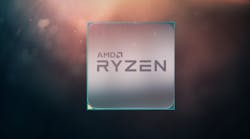AMD Steps Up Battle Against Intel with New Mobile CPU Series
>> Electronic Design Resources
.. >> Top Stories of the Week
.. .. >> CES 2021
AMD rolled out its latest central processing chips for laptops with major leaps in performance and power efficiency, stepping up its efforts to unseat Intel as the undisputed leader of the PC market.
AMD said the chips, introduced by CEO Lisa Su at the CES trade show, bring double-digit gains in performance and power efficiency, giving it the best single threaded performance in the category. The biggest improvement in AMD's new offerings, the Ryzen 5000 mobile series, is that the chips use cores based on its latest Zen 3 architecture, which it debuted in desktop processors last year.
The Santa Clara, California-based company is shedding its status as the underdog in the market for personal computer chips. It has rolled out central processing chips for desktops and laptops that can contend with or beat Intel's CPUs in performance benchmarks, and it hopes to reassert its technology leadership over Intel with the new Ryzen 5000 mobile lineup. Su said that these chips are the “most powerful PC processors ever built for ultrathin and gaming notebooks."
As Intel falls further behind rivals in rolling out its most advanced computer chips, AMD is placing pressure on suppliers like TSMC, the top contract chip maker, to boost production of its chips and get ahead of soaring demand. AMD’s market share in laptop CPUs was 20.2% in the third quarter of 2020, Mercury Research estimates, up 5.5% year over year. Intel holds the remaining share.
The Zen 3 cores deliver a generational leap of 19% in instructions per cycle (IPC) while packing a larger cache of onboard memory and increasing its overall clock speeds. Other improvements in AMD's latest Zen 3 cores also result in an average of 25% more performance in gaming while keeping power and core counts equal to its Zen 2 architecture. The cores deliver a big boost in performance without consuming any more power than its previous-generation Zen 2 cores.
AMD said it built the central processing cores in the Zen 3 architecture into a single cluster of eight cores, then doubled the amount of cache, giving each core access to all the cache on the CPU at the same time, uplifting performance. The new mobile processors are manufactured on the 7-nanometer node from TSMC, the same node used in AMD's Zen 2 cores launched in 2019.
The mobile processors strike varying balances between performance and power efficiency, featuring up to eight cores capable of processing 16 threads, or sequences of programming instructions, at once. They integrate up to 20 MB of cache within 15 W, 35 W, or 45 W power budgets. They support base clock speeds of 1.8 GHz to 3.3 GHz that boost to 4.8 GHz, up from the 4.2 GHz speed of its predecessors in the Ryzen 4000 mobile line that debuted in early 2020.
The product line includes the high-performance H-series mobile processors, which are designed for use in gaming laptops, and the U-series processors, which are targeted at new ultraportable laptops. The categories are separated into Ryzen 3, Ryzen 5, Ryzen 7 and Ryzen 9 CPUs, which roughly compete against Intel's Core i3, Core i5, Core i7 and Core i9 processor lines, respectively.
The flagship chips in the lineup —what AMD calls the HX series—include up to 8 central processing cores and 20 MB of onboard cache memory that together deliver up to 23% better single-threaded speeds and up to 17% more multi-threaded performance than its predecessor line. The chips offer base clock speeds of up to 3.3 GHz that boost to frequencies of 4.8 GHz and they consume 45 W.
The new mobile processors use the same integrated graphics as the Ryzen 4000 mobile series.
AMD also rolled out other chips in the family focused on power efficiency, bringing better battery life to ultraportable laptops. The Ryzen 7 5800U incorporates eight cores clocked at top speeds of up to 4.4 GHz, coupled with 20 MB of cache and packed in a 15 W power budget. AMD said at the same time it can supply 16% faster single-threaded speeds over its prior generation.
The chips promise major battery-life improvements for thinner, lighter PCs. AMD said that laptops built with its U-series can support up to 17.5 hours of general use and 21 hours of video playback.
The Silicon Valley company said the first laptops featuring the Ryzen 5000 mobile CPU line would hit the market by the first quarter of 2021. AMD said the new chips would power a total of more than 150 personal computers in 2021. That represents a 50% increase over the 100 models sold by Lenovo, Dell Technologies, Lenovo, Acer, and others based on AMD's Ryzen 4000 mobile CPUs.
>> Electronic Design Resources
.. >> Top Stories of the Week
.. .. >> CES 2021

